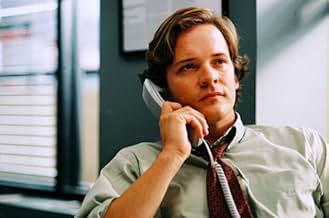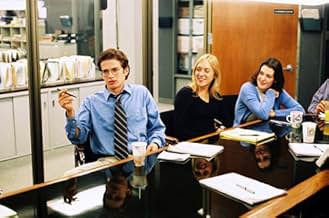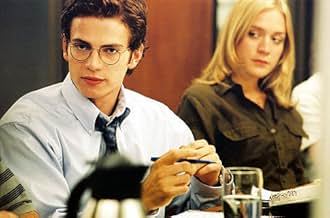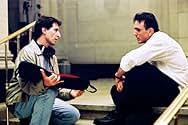La vera storia di Stephen Glass, un giornalista caduto in disgrazia quando viene alla luce che ha inventato di sana pianta oltre la metà degli articoli scritti per la rivista New Republic.La vera storia di Stephen Glass, un giornalista caduto in disgrazia quando viene alla luce che ha inventato di sana pianta oltre la metà degli articoli scritti per la rivista New Republic.La vera storia di Stephen Glass, un giornalista caduto in disgrazia quando viene alla luce che ha inventato di sana pianta oltre la metà degli articoli scritti per la rivista New Republic.
- Premi
- 11 vittorie e 28 candidature totali
Owen Roth
- Ian Restil
- (as Owen Rotharmel)
Recensioni in evidenza
I had been recommended Shattered Glass a half-dozen times by a friend. He said, after watching it - it's not a great movie, but it is really, really good. I'll disagree. Shattered Glass is a great movie.
It's not a great film (aye, there's the rub), but it is a great movie. It's entertainment, pure and simple, but it's also entertainment with depth. In that respect, it's a little like Spider Man 2.
In Shattered Glass, you'll find steady direction, sure-handed editing, an interestingly designed narrative, characters that are drawn well-enough but not so well that they overpower the story's forward movement, etc. You'll also find excellent performances.
Peter Sarsgaard, Chloe Sevigny, Steve Zahn, Rosario Dawson - they're all excellent (which they've all proved in other movies as well). Hayden Christensen, though, who was so wooden in Star Wars Episode 2, is amazing. His portrayal of Glass, though not perfect, is revelatory; he can actually act. Given time and the aid of excellent directors, Christensen will really blossom. Shattered Glass is, simply put, a solidly made movie about a journalist without the requisite integrity.
But why isn't this a great film and only top-notch entertainment? Well, it really comes down to the simple fact that Shattered Glass only scratches a surface that, in light of Jayson Blair and those of that ilk, deserves a little more attention. Of course, though, this is a film about a single event. It's not about compulsive lying or, really, lack of journalistic integrity. It touches on those subjects without delving into them. That is my only complaint. As a movie about a lying journalist, though, it's fast-paced, thrilling, and entertaining, and I think everyone will enjoy it.
It's not a great film (aye, there's the rub), but it is a great movie. It's entertainment, pure and simple, but it's also entertainment with depth. In that respect, it's a little like Spider Man 2.
In Shattered Glass, you'll find steady direction, sure-handed editing, an interestingly designed narrative, characters that are drawn well-enough but not so well that they overpower the story's forward movement, etc. You'll also find excellent performances.
Peter Sarsgaard, Chloe Sevigny, Steve Zahn, Rosario Dawson - they're all excellent (which they've all proved in other movies as well). Hayden Christensen, though, who was so wooden in Star Wars Episode 2, is amazing. His portrayal of Glass, though not perfect, is revelatory; he can actually act. Given time and the aid of excellent directors, Christensen will really blossom. Shattered Glass is, simply put, a solidly made movie about a journalist without the requisite integrity.
But why isn't this a great film and only top-notch entertainment? Well, it really comes down to the simple fact that Shattered Glass only scratches a surface that, in light of Jayson Blair and those of that ilk, deserves a little more attention. Of course, though, this is a film about a single event. It's not about compulsive lying or, really, lack of journalistic integrity. It touches on those subjects without delving into them. That is my only complaint. As a movie about a lying journalist, though, it's fast-paced, thrilling, and entertaining, and I think everyone will enjoy it.
As the subject line above says, I have to admit to an insider's point of view. I was an award-winning investigative reporter and editor working in newspapers, magazines, wire services, radio, and network-affiliate TV. I quit journalism in 1980 in large part because of the ever-increasing number of talent-challenged first-year "journalists" who wanted to be the next Woodward/Bernstein, and worse, the willingness of management (especially in local television news) to hire and even promote them. To be honest, however, I would have to add that the low pay, true even at places like The New Republic, was a major factor to an expectant father.
So I am sad to say that I completely buy the characterizations presented in this docudrama on Stephen Glass' time at that august magazine. The only thing that didn't ring true was that I never met anyone who had the time or inclination to be as considerate of his fellow journalists as Steve Glass apparently was. My wife pointed out that she never met one journalistic co-worker she would spend time with if she had the choice. I would admit that the nicest I knew were, at best, benign. I should add that I was NOT the nicest I knew. Even I didn't like me those days.
Getting back to the film, I can't speak to what actually motivated this particular person to fabricate 27 of 41 stories at a very major national magazine. The film suggests that he was too eager to please, and perhaps that is true. But that probably wasn't what motivated Jayson Blair (at the New York Times) or others who have recently been exposed as serial fabricators. Ambition unrestrained by ethics, unreasonable pressure to succeed due to premature promotions, other unknown and perhaps unknowable motivations... they probably figure into these sorts of disasters. But what is certainly true, and given very short shrift by the film, is the role journalistic management plays. To put a rather fine point to it, too many editors do not know how to, or perhaps just don't like to, do their jobs.
Too many times I see on national news programs statements treated as fact that somehow I can't believe were ever fact-checked. Just today I saw an episode of HBO's RealSports where an amazing statistic was mentioned: that a certain percentage (I believe about 4% but wasn't taking notes) of people who start playing poker as young kids go on to have gambling problems. I instantly asked myself: where did those statistics come from? Poker playing among the very young (pre-college-age) was probably a fairly rare thing before the past couple of years. How would they know today that 15 years ago such-and-such a percent would later have problems? If you understand statistics you would know that you can't find gambling addicts now, ask how many played poker as young kids, and extrapolate any useful estimate of future danger (100% of alcoholics once drank socially, but that doesn't mean 100% of social drinkers go on to become alcoholics). So did some editor at RealSports check this out? Why don't I believe someone did?
In writing this six-paragraph movie review, perhaps to be seen by no one, I checked things over time and again for accuracy. Oops: I misspelled Jayson Blair; fix it. Spelling errors no one cares about in this Internet-only story: check the entire piece in an external spell checker. In all I made almost two dozen changes. No one reading this will notice, or if they do, care. But that is what I do because I once was an editor.
It is this instinct for distrust of EVERYTHING anyone says or writes, including oneself and one's own work, that I believe is missing in far too many editors today. It is this shortcoming that allowed Stephen Glass, Jayson Blair et al to last so long before being exposed. It is a major weakness in journalism, and the lack of acknowledgement of this weakness is the only fault I found in this otherwise excellent film.
So I am sad to say that I completely buy the characterizations presented in this docudrama on Stephen Glass' time at that august magazine. The only thing that didn't ring true was that I never met anyone who had the time or inclination to be as considerate of his fellow journalists as Steve Glass apparently was. My wife pointed out that she never met one journalistic co-worker she would spend time with if she had the choice. I would admit that the nicest I knew were, at best, benign. I should add that I was NOT the nicest I knew. Even I didn't like me those days.
Getting back to the film, I can't speak to what actually motivated this particular person to fabricate 27 of 41 stories at a very major national magazine. The film suggests that he was too eager to please, and perhaps that is true. But that probably wasn't what motivated Jayson Blair (at the New York Times) or others who have recently been exposed as serial fabricators. Ambition unrestrained by ethics, unreasonable pressure to succeed due to premature promotions, other unknown and perhaps unknowable motivations... they probably figure into these sorts of disasters. But what is certainly true, and given very short shrift by the film, is the role journalistic management plays. To put a rather fine point to it, too many editors do not know how to, or perhaps just don't like to, do their jobs.
Too many times I see on national news programs statements treated as fact that somehow I can't believe were ever fact-checked. Just today I saw an episode of HBO's RealSports where an amazing statistic was mentioned: that a certain percentage (I believe about 4% but wasn't taking notes) of people who start playing poker as young kids go on to have gambling problems. I instantly asked myself: where did those statistics come from? Poker playing among the very young (pre-college-age) was probably a fairly rare thing before the past couple of years. How would they know today that 15 years ago such-and-such a percent would later have problems? If you understand statistics you would know that you can't find gambling addicts now, ask how many played poker as young kids, and extrapolate any useful estimate of future danger (100% of alcoholics once drank socially, but that doesn't mean 100% of social drinkers go on to become alcoholics). So did some editor at RealSports check this out? Why don't I believe someone did?
In writing this six-paragraph movie review, perhaps to be seen by no one, I checked things over time and again for accuracy. Oops: I misspelled Jayson Blair; fix it. Spelling errors no one cares about in this Internet-only story: check the entire piece in an external spell checker. In all I made almost two dozen changes. No one reading this will notice, or if they do, care. But that is what I do because I once was an editor.
It is this instinct for distrust of EVERYTHING anyone says or writes, including oneself and one's own work, that I believe is missing in far too many editors today. It is this shortcoming that allowed Stephen Glass, Jayson Blair et al to last so long before being exposed. It is a major weakness in journalism, and the lack of acknowledgement of this weakness is the only fault I found in this otherwise excellent film.
A young D.C. journalist (new "Star Wars" trilogy star Hayden Christensen) for The New Republic political magazine falsifies data and produces fraudulent stories. Slowly but surely his would-be meteoric rise turns into a dizzying downfall. "Boys Don't Cry" alums Peter Saarsgard and Chloe Sevigny are out of this world as Christensen's editor and supportive co-worker. Based on a true story, the picture has a tense documentary feel to it that makes it highly engrossing and fascinating early. The production does begin to tire late though as Christensen's crazed personality starts to come shining through with dementedly over-the-top results. Still a well-paced and intelligent take on American journalism and the pressures associated with the field. Worth a legitimate chance. 4 stars out of 5.
The public-at-large loves a good scandal, and in 1998, the scandal involving Stephen Glass was a pretty darn good one. It turned out that Glass, a young prodigy who was writing for several magazines, but primarily for the prestigious 'New Republic' ('the in-flight magazine of Air Force One') had fabricated some or all of 21 of his 41 well-received stories; a scandal that rocked the journalism world and was picked up by the general public and was later repeated with Jayson Blair.
'Shattered Glass', co-written and directed by Billy Ray examines this true-life story, with Hayden Christensen playing Glass and Peter Sarsgaard as his editor, Chuck Lane. I have never seen Christensen's work in anything else until this point, and I was impressed by his acting chops. He was able to handily express Glass's desperate need for acceptance and his compulsive and repulsively cunning nature so well that the viewer, when faced with the dilemma of how to feel about this man, can only watch numbly as the train wreck that becomes his life careens further out of control. Sarsgaard, as usual, is fantastic as the fair and decent-minded Lane, the editor who first tries to help and protect Glass, but then, after digging deeper, finds that there is a lot more to the man than sloppy journalism.
It is actually surprising to me that 'Shattered Glass' became a film. I remember reading a Vanity Fair piece on Glass back when the scandal broke, and that, and the myriad other articles seemed to be sufficient exposure. The fact that 'Shattered Glass' was released five years after the scandal settled down, and that it is a compelling screenplay and film is a testimony to Ray's (a first time director) talent. 'Shattered Glass' is gut-wrenching in that it is difficult to watch because the viewer knows how deep Glass digs himself, and it's not necessarily fun to watch. 'Shattered Glass' is an intelligent, well-done film and I would definitely recommend it to anyone who appreciates that a film doesn't have to be showy in order to make an impact.
--Shel
'Shattered Glass', co-written and directed by Billy Ray examines this true-life story, with Hayden Christensen playing Glass and Peter Sarsgaard as his editor, Chuck Lane. I have never seen Christensen's work in anything else until this point, and I was impressed by his acting chops. He was able to handily express Glass's desperate need for acceptance and his compulsive and repulsively cunning nature so well that the viewer, when faced with the dilemma of how to feel about this man, can only watch numbly as the train wreck that becomes his life careens further out of control. Sarsgaard, as usual, is fantastic as the fair and decent-minded Lane, the editor who first tries to help and protect Glass, but then, after digging deeper, finds that there is a lot more to the man than sloppy journalism.
It is actually surprising to me that 'Shattered Glass' became a film. I remember reading a Vanity Fair piece on Glass back when the scandal broke, and that, and the myriad other articles seemed to be sufficient exposure. The fact that 'Shattered Glass' was released five years after the scandal settled down, and that it is a compelling screenplay and film is a testimony to Ray's (a first time director) talent. 'Shattered Glass' is gut-wrenching in that it is difficult to watch because the viewer knows how deep Glass digs himself, and it's not necessarily fun to watch. 'Shattered Glass' is an intelligent, well-done film and I would definitely recommend it to anyone who appreciates that a film doesn't have to be showy in order to make an impact.
--Shel
As the film opens we meet Stephen Glass, a rising star at "The New Republic" magazine. He's sensitive, friendly and unfailingly polite. And, oh yeah, did I mention he was on everybody's hot list? He was being wooed by everyone from "George Magazine" to "Harper's" to the "New York Times." Unfortunately, behind the Glass juggernaut was a compulsive liar who took everyone for a downhill ride. You see, Glass fabricated over 20 stories, inventing sources, locations, times, dates, and companies.
Hayden Christensen was fabulous as the ingratiating/creepy Glass. As a CNN.com reviewer pointed out, this movie proves he can act.
Christensen's Glass is the ultimate likeable co-worker, who remembers everyone's birthday, knows how everyone takes their coffee and is so self-deprecatingly sweet that when things start unraveling you feel sorry for him. Despite his audacious lies and deceits, you like him and wonder why everyone is being so mean. Christensen walks the fine line between good and evil so well, you watch in amazement. You feel sorry for him, you're repulsed by him, you're embarrassed for him...
At times I turned to my friend and said "Man! Is this hard to watch." And it was.
Peter Sarsgaard, who plays Glass' editor, Chuck Lane, is wonderfully understated as the misunderstood editor. (For those at home who care, he's also really cute in that nerdy handsome way.)
The movie incisively exposes the world of journalism -- with it's big egos, pedantic copy editors, and ultra-competitive writers. I could see many of my co-workers (current and former) in the archetypes portrayed on screen (the braggart, the attention getter, the know-it-all, the guy who will split the most microscopic of hairs just for the heck of it).
It also brings home the incredible responsibility on the shoulders of journalists. It's easy to forget this responsibility in pursuit of personal glory or attention, but it's the reader who gets hurt. Everyone in the business of journalism should see this movie. But with its twists and turns and shocking (yet true!) events, it's a movie for anyone who enjoys a good thriller.
Hayden Christensen was fabulous as the ingratiating/creepy Glass. As a CNN.com reviewer pointed out, this movie proves he can act.
Christensen's Glass is the ultimate likeable co-worker, who remembers everyone's birthday, knows how everyone takes their coffee and is so self-deprecatingly sweet that when things start unraveling you feel sorry for him. Despite his audacious lies and deceits, you like him and wonder why everyone is being so mean. Christensen walks the fine line between good and evil so well, you watch in amazement. You feel sorry for him, you're repulsed by him, you're embarrassed for him...
At times I turned to my friend and said "Man! Is this hard to watch." And it was.
Peter Sarsgaard, who plays Glass' editor, Chuck Lane, is wonderfully understated as the misunderstood editor. (For those at home who care, he's also really cute in that nerdy handsome way.)
The movie incisively exposes the world of journalism -- with it's big egos, pedantic copy editors, and ultra-competitive writers. I could see many of my co-workers (current and former) in the archetypes portrayed on screen (the braggart, the attention getter, the know-it-all, the guy who will split the most microscopic of hairs just for the heck of it).
It also brings home the incredible responsibility on the shoulders of journalists. It's easy to forget this responsibility in pursuit of personal glory or attention, but it's the reader who gets hurt. Everyone in the business of journalism should see this movie. But with its twists and turns and shocking (yet true!) events, it's a movie for anyone who enjoys a good thriller.
Lo sapevi?
- QuizThe real Stephen Glass was offered a role. He declined.
- BlooperAt 47:59 there is an overlay on the screen saying it is May 8, 1998, and lane is going in to discuss the fallout from the article Hack Heaven. But the article had been published May 18th, 1998.
- Citazioni
Stephen Glass: [Outside the closed restaurant] I didn't do anything wrong, Chuck.
Chuck Lane: I really wish you'd stop saying that.
- Versioni alternativeThere are three versions available, of different lengths. Runtimes are: "1h 34m (94 min)", the most available, theatrical cut, "1h 29m (89 min) (Australia)" and "1h 39m (99 min) (Toronto International) (Canada)" film festival original cut.
- Colonne sonoreWild Thing
Written by Chip Taylor
Performed by X
Used by permission of EMI Blackwood Music Inc.
Courtesy of Elektra Entertainment Group
By Arrangement with Warner Strategic Marketing
I più visti
Accedi per valutare e creare un elenco di titoli salvati per ottenere consigli personalizzati
Dettagli
Botteghino
- Budget
- 6.000.000 USD (previsto)
- Lordo Stati Uniti e Canada
- 2.220.008 USD
- Fine settimana di apertura Stati Uniti e Canada
- 77.540 USD
- 2 nov 2003
- Lordo in tutto il mondo
- 2.944.752 USD
- Tempo di esecuzione1 ora 34 minuti
- Colore
- Mix di suoni
- Proporzioni
- 2.35 : 1
Contribuisci a questa pagina
Suggerisci una modifica o aggiungi i contenuti mancanti

Divario superiore
By what name was L'inventore di favole (2003) officially released in India in English?
Rispondi






































